Overview
- The digital age has altered how social work practice operates
- Of particular concern is social media
- It provides an online platform where individuals can easily interact irrespective of their location
- Some of the social media sites include Facebook, Myspace, Skype, and Twitter
Most social workers have subscribed to at least one of the several social media sites Consequently, the application of this modern communication medium within the scope of professionalism of social work practice benefits the practitioners because of the readily available online audience.
However, it is crucial to point out that social media also raises ethical issues such as creating and maintaining a boundary between personal life and professionalism, self-disclosure, and confidentiality.
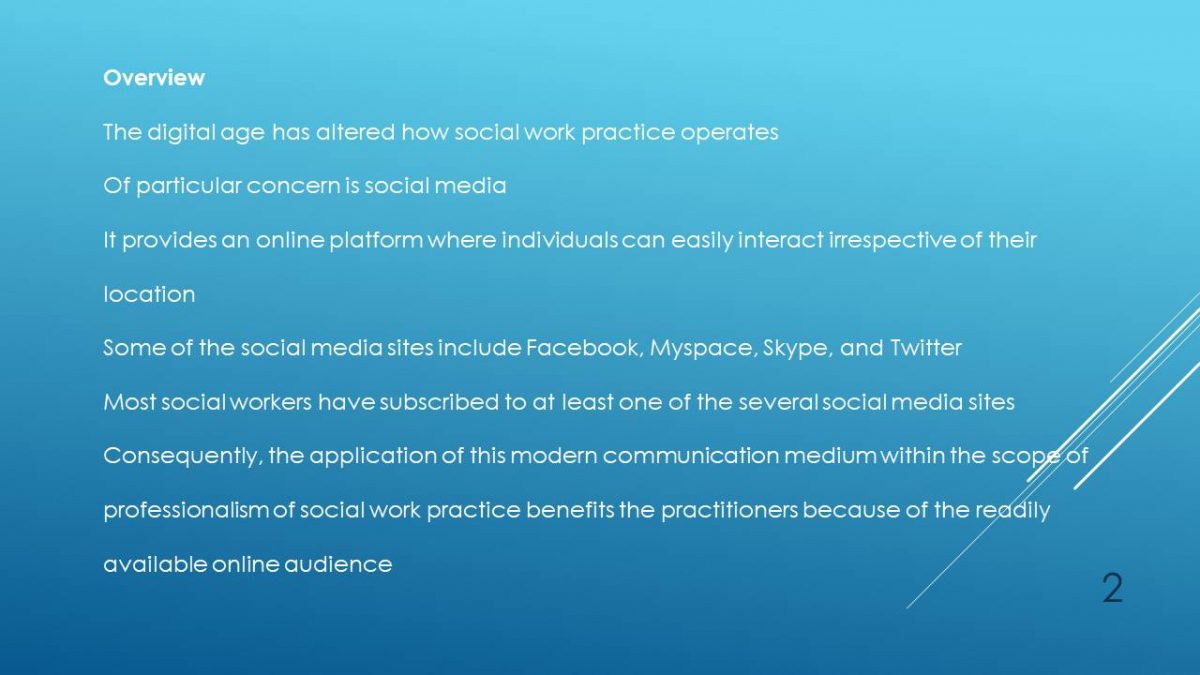
Review of Journals
- Voshel, E., & Wesala, A. (2015). Social Media & Social Work Ethics: Determining Best Practices in an Ambiguous Reality. Journal of Social Work Values & Ethics,12(1), 67- 76.
- Voshel and Wesala (2015) assert that in the contemporary age of social media, social workers must be cautious of the ethical behaviors
- The authors observe that the existing code of ethics is an inadequate tool for solving the ethical dilemma created by social media
- They encourage social workers to develop risk management tactics and further provide recommendations
The digital age requires practitioners to embrace technology, maintain the confidentiality of the clients’ information, and initiate proper limitations with respect to professional and personal relationships Voshel & Wesala, 2015) . Furthermore, the authors urge policymakers to incorporate social guidelines during the coaching of social workers to help them tackle ethical impasses caused by social media.
- Casella, E., Mills, J., & Usher, K. (2014). Social media and nursing practice: Changing the balance between the social and technical aspects of work. Collegian,21(2), 121-126.
- Casella, Mills, and Usher (2013) assert that the nursing profession needs to conform to the modifications introduced by the social media technology
- With reference to the sociotechnology concept, the authors argue that nurses will work passionately as long as there is optimal stability between the social and the technical features of their career
- However, they observe how the modern technology has tightened the link between the social and technical aspects, thus making networking a multi-method course
Since the world is drastically turning to social media as a medium of interaction, Casella et al. (2013) encourage clinicians to utilize this opportunity to establish a profound relationship with their patients and colleagues to offer a more inclusive care.
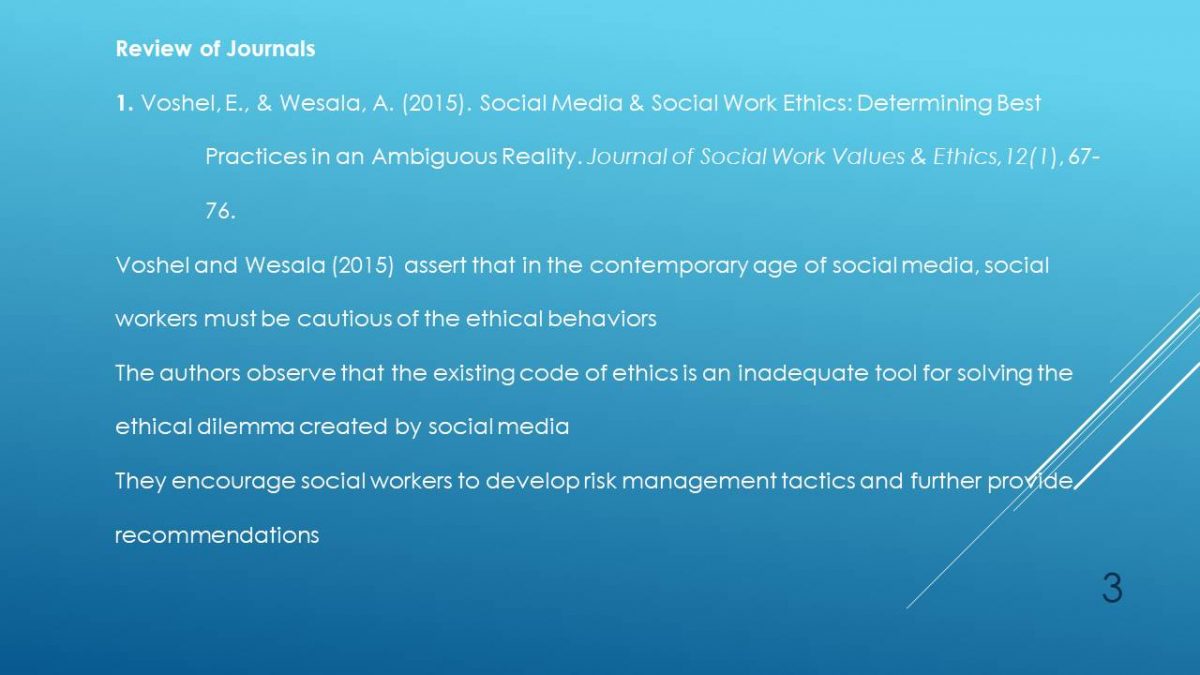
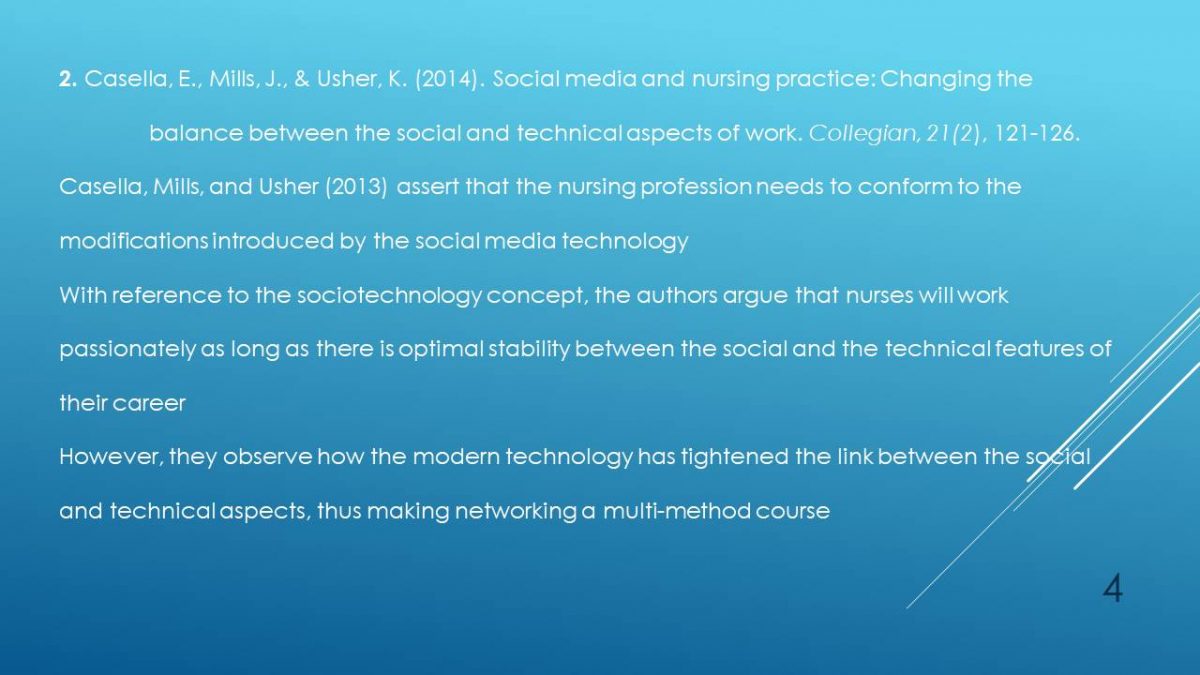
Ethical Standards: NASW Code of Ethics
Strengths of NASW Code of Ethics in relation to Social Media and social work Practice
According to the National Association of Social Workers (2008),the Code of Ethics does not mention social media and other modern modes of communication directly. Nevertheless, it offers a direction on various ethical challenges that social workers face in the social networking sites. In fact, the drafters admit that the Code of Ethics cannot offer immediate answers to ethical issues. However, social workers should ensure that their decisions and behavior are consistent with the provisions of the Code. The ensuing discussion explains some of the strengths of NASW code of ethics in relation to social media and social work practice.
It follows that although social media offers a new setting for networking and communication, the moral dilemmas are not exceptional. Hence, most of the ethical tenets and ideals are applicable.
Foremost, it provides that social workers should venerate the natural dignity and value of an individual. The provision entails upholding the right of patients to make decisions as they desire. Such principles are applicable within the realm of social media. Social workers should always consider and defend the needs of their clients above other interests even when interacting on a digital platform. They should avoid overindulging into their personal dealings. Secondly, the Code of Ethics provides that social workers should have integrity. Fairness, trustworthiness, as well as transparency are the tenets that govern every action in the social work practice, which includes sharing information via modern communication media such social networking sites.
Social workers should limit their interaction within the domain of professional relationship. Moreover, they should be conversant with the patients’ racial and cultural background and how they influence their thinking and character.
Where there seems to be an intrusion, the NASW Code clearly guides on how one should make an ethical decision. It directs them to shun conflict of interests, which may impede them from making fair and just decisions. NASW Code of Ethics also underpins the need for confidentiality in social work practice. Since clients share and trust them with personal information, it is only ethical for social workers to ensure that such information remains confidential. They should only share it when given consent by the clients. Moreover, social workers should request for confidential information only when they believe that it is crucial for quality service delivery.
Social workers have the task of ensuring that the connections they make with clients are appropriate. Furthermore, they should examine and determine if social media blurs the practitioner-client boundary. Consequently, if the multiple relationships in the social media interferes with their integrity, then social workers should take risk management steps to protect it (Voshel & Wesala, 2015). Confidential information should only be meant for the best interest of the client. Hence, it should remain as a secret between the social worker and patient.
NASW also highlights the need for social workers to be skilled in their professional practice. As such, social workers should first familiarize themselves with the merits and risks of social media prior to using it as a forum for advancing their profession. This step helps them to construct policies that assist them to counter any potential challenge. They should also remain informed of the new developments in social media platforms such that their decisions are consistent with existing technology.
Skilled practitioners know when it is safe to share the information with workmates, friends, and the families whether in a formal or informal context. However, when using social media, social workers should not be tempted to post private information of current or former clients to the public. It does not matter whether they reveal or conceal the patients’ identity.
Areas not addressed by NASW Code of Ethics in relation Social Media and Social work practice
The NASW Code of Ethics seeks to offer guidance for almost every ethical impasse that practitioners face. Nevertheless, there are some gray areas, especially with respect to social networking. First, non-therapeutic connections that occur online severely affect the veracity of practitioner-client relationship. A patient who establishes a cyberspace contact with a social worker may eventually view the practitioner as an acquaintance and vice versa. This situation seriously hampers the provision of professional services. However, NASW Code provisions are equivocal on such online relationships.
Although the provisions direct social workers to avoid situations that may create conflict of interests, it does not bar cyberspace contact, particularly because of the nature of online connections.
Most of the social network sites subscribers use pennames, rather than the actual names and provide distorted information about themselves. Accordingly, most people perceive online friendships as more fictitious than genuine. Contritely, they often have severe implication on therapeutic relationships.
Millions of people have stored their information on the Internet. Much of the data is accessible by a simple click on the Google search button. Social media sites such as Twitter and Facebook request subscribers to provide personal information which is often shared with the public. Social media users offer such details willingly and are aware that they expose their life to the world Hence, social workers, just like other social media subscribers, can access the data without seeking any consent.
Social media creates an ethical paradox since it is imprecise whether such information can be termed as private or public in the context of the NASW Code of Ethics. Evidently, the issue of ensuring confidentiality is progressively becoming an unbearable challenge that NASW Codes fails to tackle.
Blogging has also caused an ethical dilemma that NASW Codes barely addresses. For instance, most practitioners, just like most bloggers, are in the habit of sharing their daily life experiences to the world. They post their work experiences with the other bloggers and online audience (Casella et al., 2014). While this situation may appear an unprincipled behavior, it has become a normal practice for social workers to post work-oriented protests on social media. Unfortunately, most workers have not been reprimanded for their actions because of the informal context of social media and the absence of a precise direction in the NASW Codes.
Most institutions are creating blogs where practitioners can share clinical experiences with colleagues. In fact, NASW also runs a blog that acts as a discussion forum for social work practice. However, this strategy raises various ethical issues. Although anyone can run a blog, clients will always trust the credibility of the information posted. Errors on such blogs may tarnish the integrity of social work practice. Although this case may destroy the reputation of many innocent practitioners, there is no mechanism offered by NASW Code to deter such threats (Voshel & Wesala, 2015).
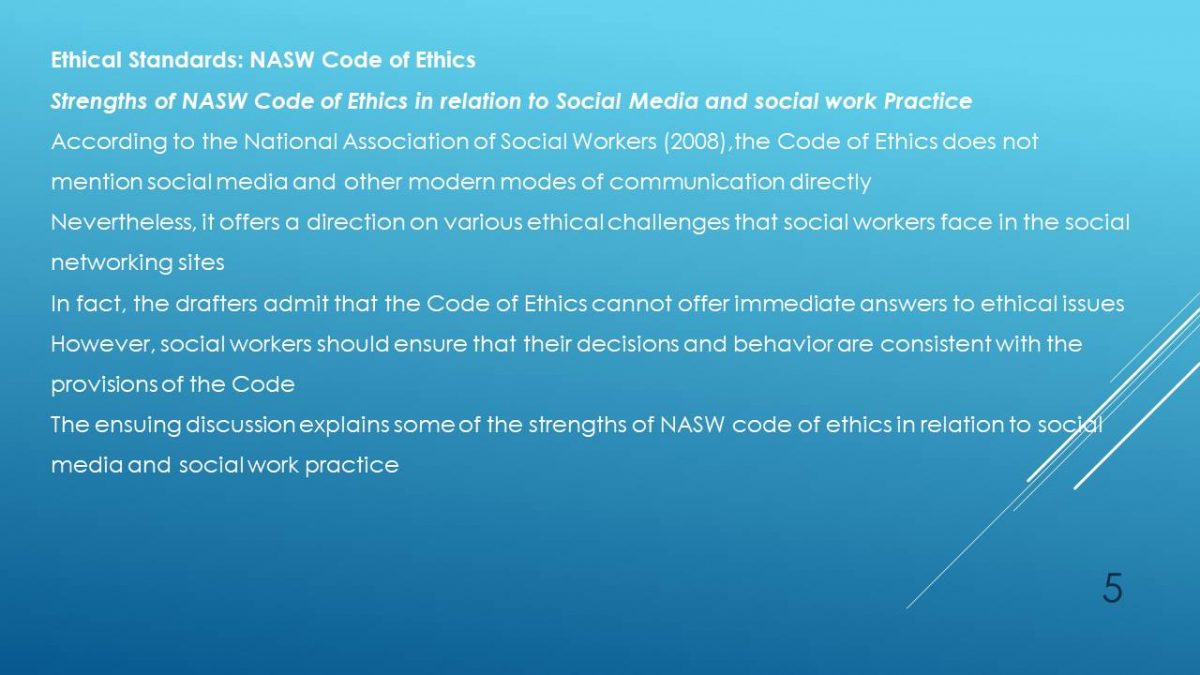
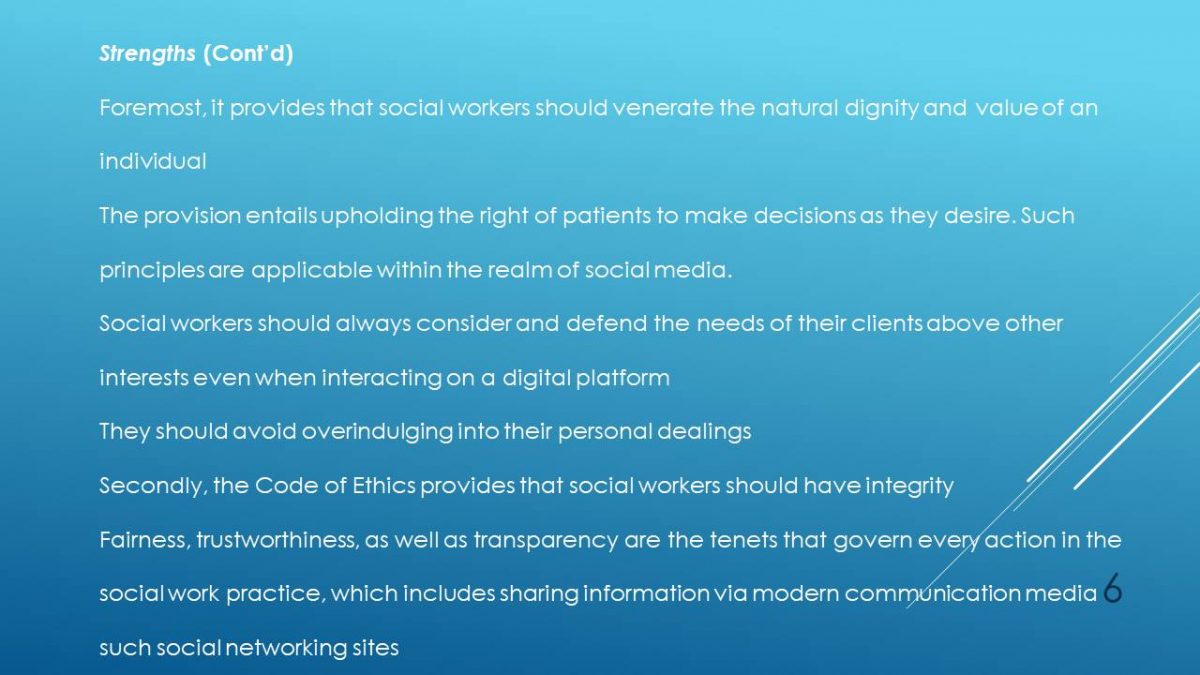
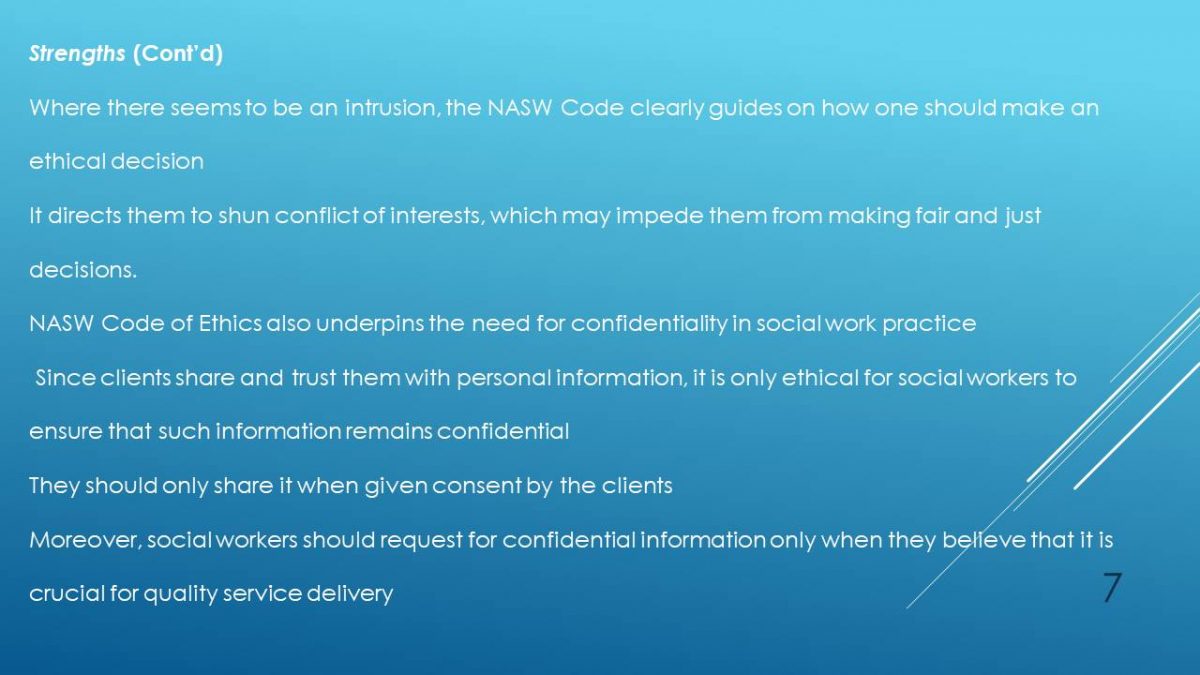
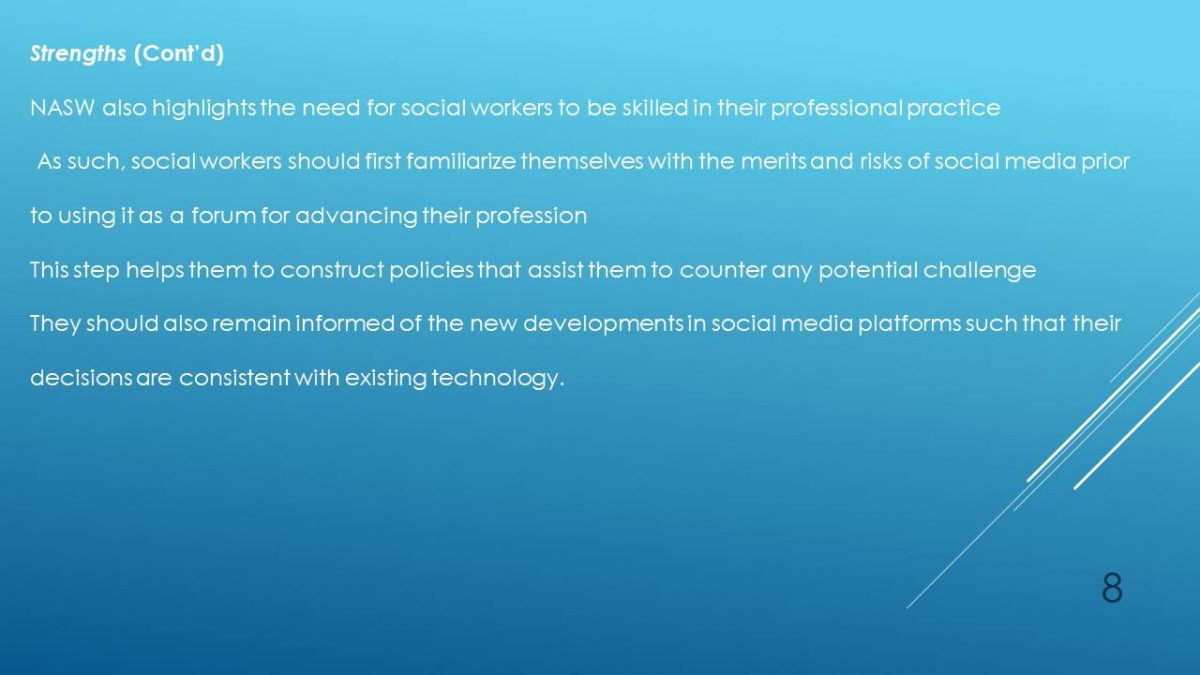
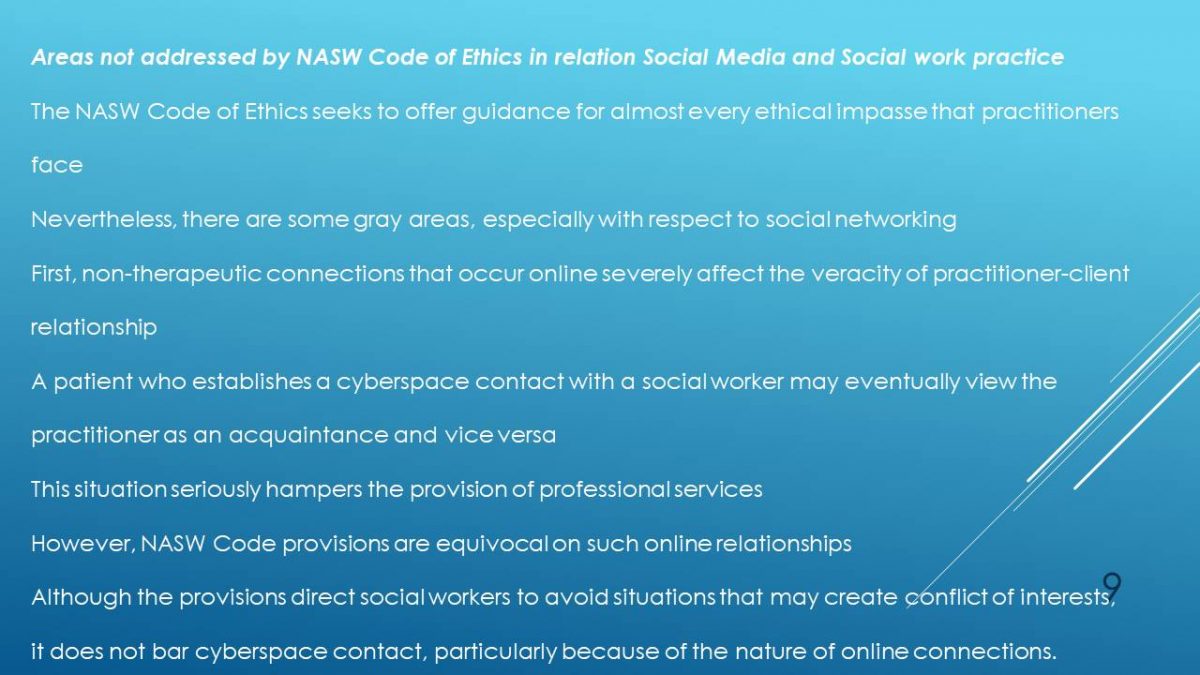
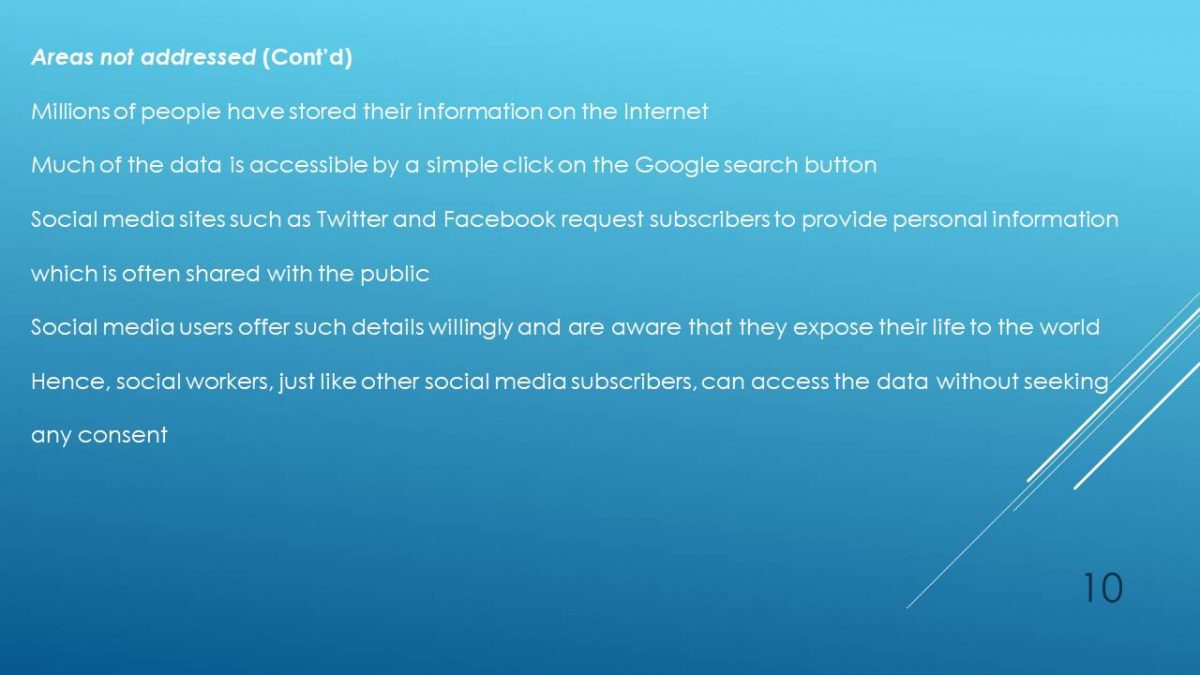
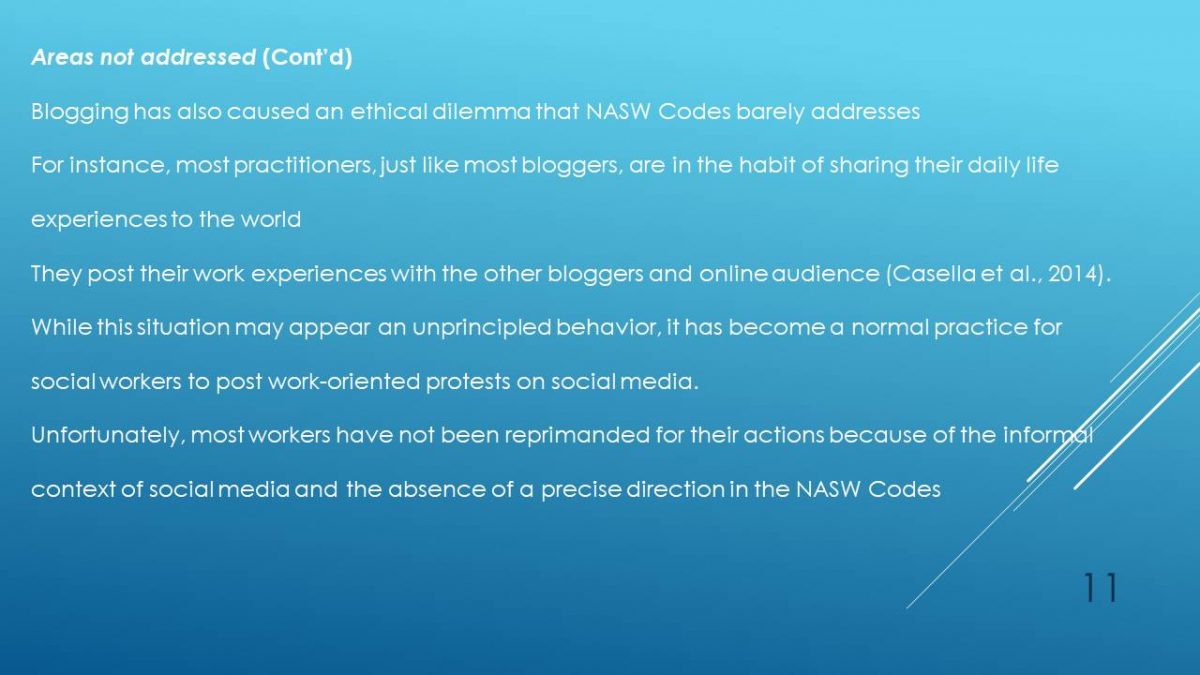
Three ASWB Standards
Policy 3.08 requires that the confidentiality of all data relating to the client obtained or stored digitally or by any other electronic method be well protected greatly. However, there are exceptions to this policy that outline the incidents under which that confidentiality may be breached. Communication with clients may take place on various platforms such as social media sites, email, videoconferencing, text messaging, or even online chat (Association of Social Work Boards, 2015).
According to policy 4.03, such communications should be strictly professional and related to the service that the client is receiving from the social worker. Policy 6.02 prohibits the invasion or compromise of privacy of a colleague. One of the ways of compromising a colleague’s privacy is disclosing private information relating to their personal life.
With reference to policy 3.08, one exception is where the protection of that information may be of harm to a verifiable individual. It may be the client or any other known person. The peril must be foreseeable and imminent. Proof must be availed of the risk that may follow nondisclosure of the information. Another instance whereby such information can be disclosed is where it is a matter of law. When a statute, regulation, or court order requires that such information be disclosed, then it is in line with ASWB policies to disclose the information.
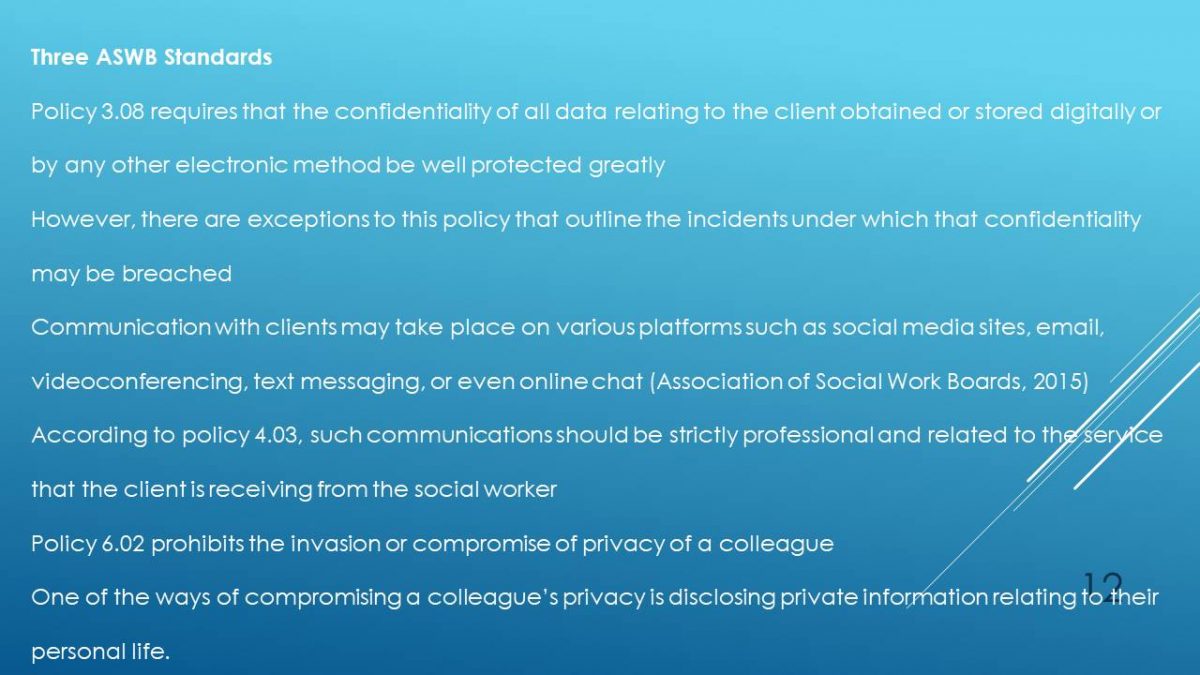
Three ASWB Standards: How they affect Social Media and Social Work Practice
According to the Association of Social Work Boards (2015), policy 3.08 upholds the protection of information concerning the client. Most social works that are offered to individuals or groups require privacy because of the sensitivity of the information about the client. The works involve counseling or other forms of special treatment. Policy 4.03 requires the consent of the client for any communication.
It is easier to pass information and have a closer understanding of the client. However, it is also easy to access information, which they do not intend to share regarding the client. Sharing information over social media makes it accessible to all people using the same network. Policy 6.02 prohibits the sharing of information, whether personal or work related, belonging to a colleague on social media without consent. Once such information is shared on social media, it is almost irretrievable.
Social media has made the transmission and acquisition of information very easy. It is easy for a piece of information to be spread to a great number of people in a very short span of time. Dissemination of a client’s sensitive information may be destructive to them. In some cases, such information may even insecure the client. It is easy to follow clients on social media and communicate to them through messages. Besides, it is also easy to harass a client on social media. Mistreatment may apply in a case where the client has not consented to the communication conducted over social media.
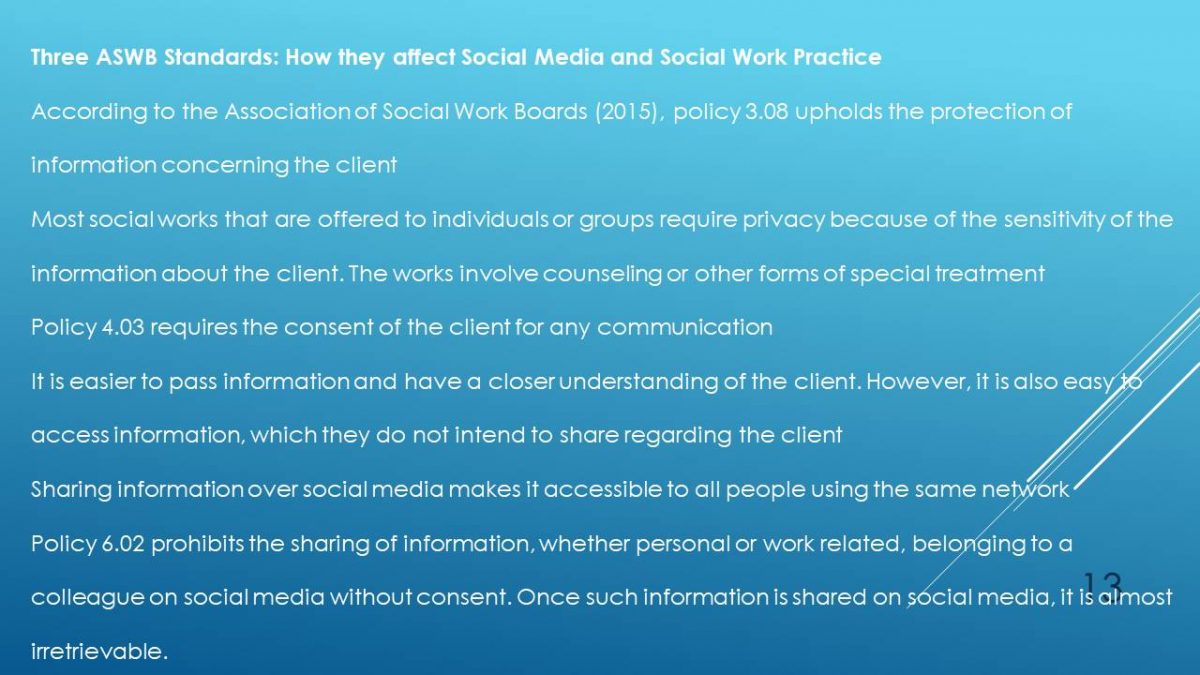
Implications of the Three standards to Social Workers
The requirement in policy 3.08 that information belonging to clients be kept confidential improves the quality of services offered. Clients feel more secure giving their details and information to the service providers. It guarantees that sensitive information about a client does not get to social media. The policy has played the role of ensuring that clients do not go through unnecessary distress following the mishandling of their confidential information. The relationship between the client and social worker should be professional. The requirement in policy 4.03 that all communications be related to the service provided ensures that such a relationship is maintained all through the treatment.
Policy 3.08 also creates the prospect of a social worker facing stringent penalties for breaching such policies. Policy 4.03 creates the appropriate boundaries required during such work. The requirement of strict professionalism improves the quality of services offered to the client.
Communication can only be conducted with the consent of the client. This situation minimizes the risk of harassment of the client. It also ensures that all relations that ensue are consented to by the patient (Reamer, 2013). The prohibition of sharing information about colleagues without their consent under policy 6.02 protects workers from having their sensitive personal or work information broadcasted over social media. Such breach of confidentiality may be hazardous to the affected social workers. It may be destructive to their career or personal life. The policy protects both the professional and personal life of social workers.
Policy 6.02 also creates the opportunity of having the worker who breaches such confidentiality face the penalties for the offense. The protection of a worker’s personal information also increases professionalism in relating with the clients.
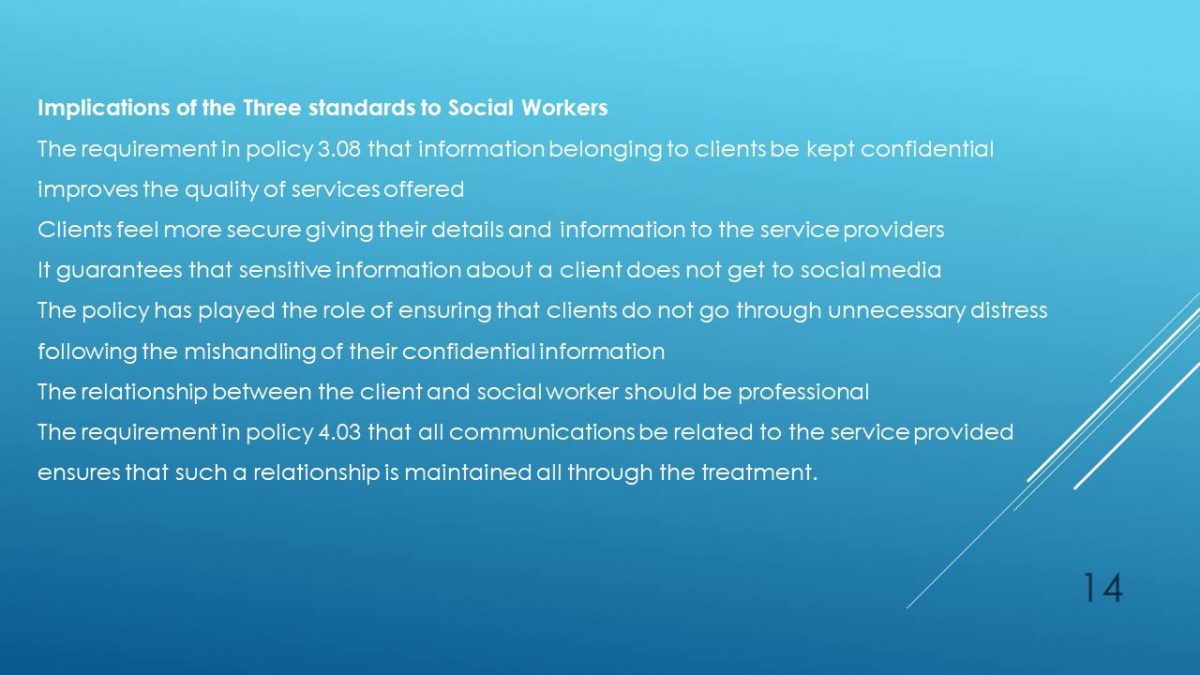
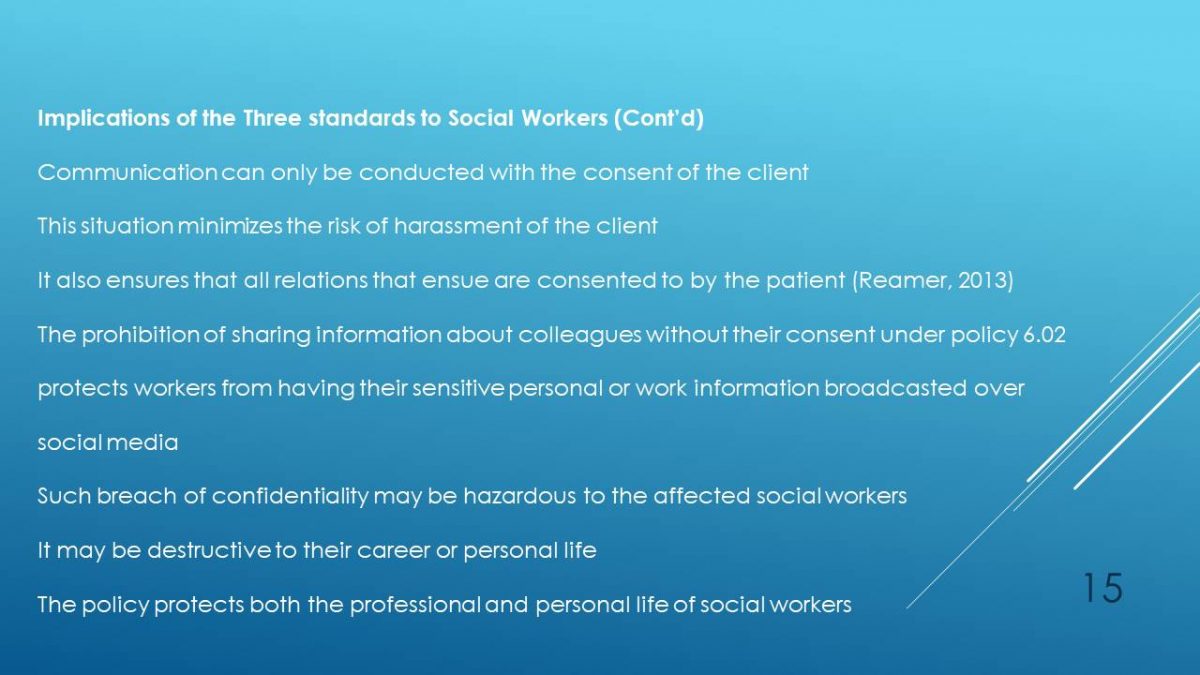
Reference List
Association of Social Work Boards. (2015). Model Regulatory Standards: ASWB Model Regulatory Standards for Technology and Social Work Practice. Web.
Casella, E., Mills, J., & Usher, K. (2014). Social media and nursing practice: Changing the balance between the social and technical aspects of work. Collegian,21(2), 121-126.
National Association of Social Workers. (2008). Code of ethics of the National Association of Social Workers. Web.
Reamer, F. (2013). Social work in a digital age: Ethical and risk management challenges. Social Work, 58(2), 163-172.
Voshel, E.,& Wesala, A. (2015). Social Media & Social Work Ethics: Determining Best Practices in an Ambiguous Reality. Journal of Social Work Values & Ethics,12(1), 67-76.